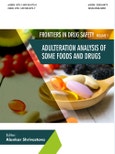Adulteration refers to the practice of altering food or pharmaceutical content to reduce production costs. Factors affecting this practice include market forces such as easy availability of food adulterants, bargaining power of consumers and large demand and supply gaps which incentivize such practices. Technological advancements in chemical analysis now help us to identify adulterated food and drugs more easily.
Adulteration Analysis of Some Foods and Drugs is a sourcebook describing analytical methodologies for the determination of adulterants in different food items (milk, honey, juice) and drugs (dietary supplements, sildenafil and specific plant extracts). Additional chapters give guidelines for analyzing a food or drug sample. This book is suitable for researchers working in the field of analytical chemistry for the determination of adulterants. The concise and organized presentation of the contents also serves to enhance the level of knowledge of students undertaking food and drug safety/quality control training courses.
Table of Contents
Chapter 1 Introduction (Food, Food Fraud, History of Adulteration)
Chapter 2 Genomics For Detecting Adulteration In Dairy Food Chain
Chapter 3 Inspection of Colorant Adulteration by Modern Lc Mass Spectrometry
Chapter 4 Adulteration Analysis of Honey (2014-2017)
Chapter 5 UV Spectrophotometry: Applications In Adulteration Analysis of Drugs
Chapter 6 Adulteration Analysis of Pomegranate Juice
Chapter 7 Adulteration of Synthetic Substances In Dietary Supplements
Chapter 8 Adulteration of Food Supplements and Analytical Methodologies For Their Quality Control
Chapter 9 Brief Overview of Trans Fat Analysis In Some Foods
Chapter 10 Analysis of Adulterants In Saffron
Subject Index
Author
- Alankar Shrivastava
- Keshav Sinha








